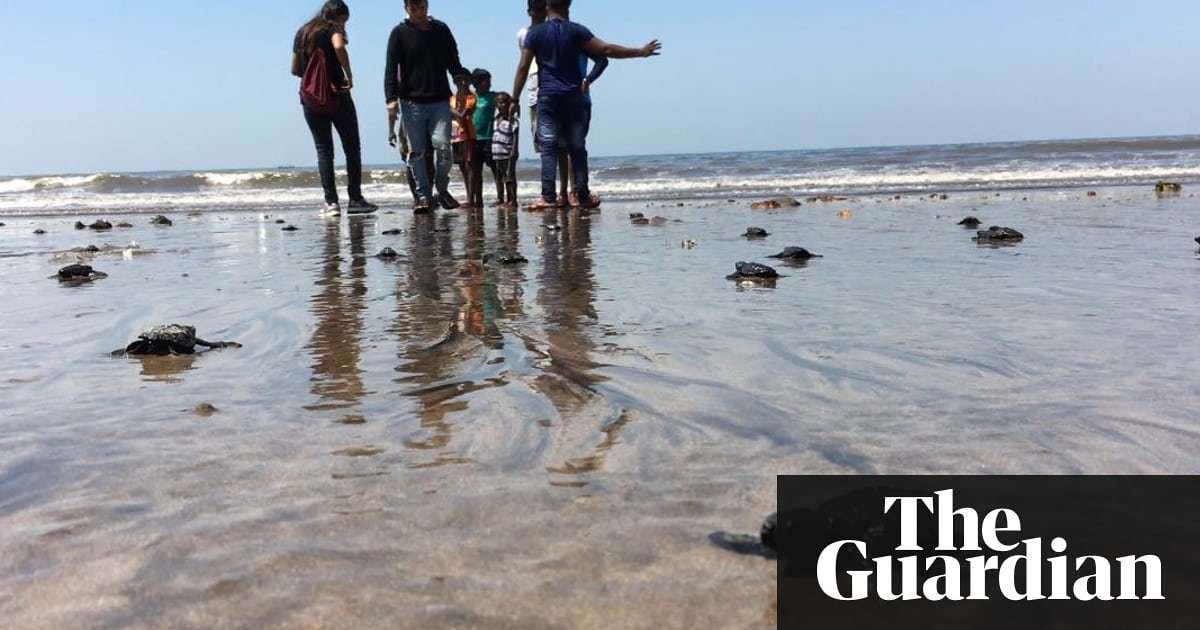Hatchlings from a vulnerable turtle species have been spotted for the first time in decades on a Mumbai beach that was rejuvenated in the past two years by a massive volunteer cleanup operation.
At least 80 Olive Ridley turtles have made their way into the Arabian Sea from nests on the southern end of Versova beach in the past week, protected from wild dogs and birds of prey by volunteers who slept overnight in the sand to watch over them.
Versova has undergone what the United Nations has called the “world’s largest beach cleanup project” over the past two years, transformed from a shin-deep dump yard for plastics and rubbish to a virtually pristine piece of coastline.
The man who leads the ongoing cleanup operation, the lawyer Afroz Shah, said he started anticipating the turtle hatchings two months ago when farmers on the southern end of the two-mile (3km) beach reported seeing turtles in the sand.
Facebook Twitter Pinterest Olive Ridley turtle hatchlings in a container as they are helped by wildlife conservationists to reach the Arabian Sea on Versova beach in Mumbai. Photograph: AFP/Getty Images
“The moment we got that news I knew something big was going to happen,” he told the Guardian. Last Thursday, some of his volunteers called to say they had spotted dozens of baby Olive Ridley turtles emerging from their nests.
He called the forest department and then went down to the beach with about 25 others, guarding the area while the tiny creatures hobbled across the sand, “making sure not one hatchling suffered a death”, he said.
The Olive Ridley species, thought to be named for the olive-green hue of its upper shell, is the smallest and most abundant sea turtle in the ocean, but is still classified as vulnerable by the International Union for Conservation of Nature.
Mothers of the species lay eggs in an enormous mass-nesting process known as arribada. Last month on the coast of the eastern Indian state of Odisha, a record 428,083 Olive Ridley turtles nested simultaneously at the Rushikulya rookery.
Though they nest elsewhere in Mumbai, none had been sighted on Versova beach in decades, due to the acute pollution problem there, Shah said. “I had tears in my eyes when I saw them walking towards the ocean.”
Sumedha Korgaonkar, who is completing a PhD on Olive Ridley turtles with the Wildlife Institute of India, said it was possible small numbers of the turtles had been nesting on the beach in past years. “We can’t say for sure since regular patrolling for turtles nests is not done in Mumbai,” she said.
Facebook Twitter Pinterest Clean-up at Versova beach. Photograph: Shashi S Kashyap/Hindustan Times/Getty Images
“Beach cleanups definitely have a positive effect on nesting turtles. Many beaches which are major nesting sites are cleaned prior and during the nesting season by villagers, which increases the chances of getting nests [there].”
For more than two years, Shah has been leading volunteers in manually picking up rubbish from Versova beach and teaching sustainable waste practices to villagers and people living in slums along the coastline and the creeks leading into it.
About 55,000 people live along the beach and the waterways that feed it in the crowded megacity. Shah said he taught them by example, offering to clean communal toilets and pick up rubbish himself before he ever sought their help.
“For the first six to eight weeks, nobody joined,” he said. “Then two men approached me and said, very politely, ‘Please sir, can we wear your gloves?’ Both of them just came and joined me. That’s when I knew it was going to be a success.”
Quick guide What is the Upside? Show Hide News doesn't always have to be bad – indeed, the relentless focus on confrontation, disaster, antagonism and blame risks convincing the public that the world is hopeless and there is nothing we can do. This series is an antidote, an attempt to show that there is plenty of hope, as our journalists scour the planet looking for pioneers, trailblazers, best practice, unsung heroes, ideas that work, ideas that might and innovations whose time might have come. Readers can follow up with our Further Reading guides and can also recommend other projects, people and progress that we should report on by contacting us at [email protected]
Sign up here for a weekly emailed roundup from this series
He said the team had cleaned 13m kg of debris from the beach in the past two years and are still going, though their campaign was briefly abandoned in November because of “administrative lethargy” and harassment of volunteers.
India has some of the most polluted waterways and beaches in the world due to rapid, unplanned urbanisation, overpopulation and neglectful attitudes, including to public littering.
“There has been a loss of a sense of belonging,” Shah said. “You can have laws, policies, regulations in place, but if the community doesn’t have a sense of belonging, you can see what happens.”
This article is part of a series on possible solutions to some of the world’s most stubborn problems. What else should we cover? Email us at [email protected]

hippopig on March 30th, 2018 at 13:48 UTC »
My gf is getting very interested in sea turtle preservation.
Apparently our next holiday is somewhere we can help.
Edit: she’s also trying to raise awareness through her work :)
garudamon11 on March 30th, 2018 at 13:40 UTC »
This is how it used to look like, and now
Arknell on March 30th, 2018 at 10:50 UTC »
Olive Ridleys are so incredibly beautiful...